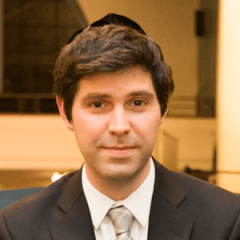
Cantor Jay O’Brien
Cantor Jay O'Brien is the cantor at Congregation Solel in Highland Park, IL.
Why did you become a Cantor? What influenced you?
I grew up in a traditional, “conservadox” style synagogue community in St Louis. We did not have a cantor, and so after becoming bar mitzvah there were opportunities to daven and leyn Torah/haftarah. I had some very good mentors after my Bar Mitzvah who encouraged me to study nusach books like Spiro and Katchko, and to find jobs as a young cantorial soloist at Reform and Conservative shuls in the area. I continued to work in the capacity during high school and college. Looking back, I have been on the cantorial track for quite a while.
Given your experience, what’s the best thing about being a cantor?
The “shecheheyanu moments.” As clergy, you are present for some of the most powerful moments in the lives of your congregants and constituents. The ways in which we as cantors invoke the words and sounds of our tradition becomes a part of our congregant’s memories. To help serve that role in people’s lives – whether at a baby naming, b’nei mitzvah, wedding, or funeral – is an inspiring and humbling responsibility.
Is there a bit of a disconnect between what you learned in school, your student pulpits and being a full time cantor?
I feel that my time at HUC and at my cantorial internship has prepared me well for the responsibilities of being a full-time cantor. That said, one personal challenge in the transition from student to full time cantor I have encountered concerns strategies for change within the synagogue system. When you are a student, you are necessarily limited in what you can change about the system in which you operate. However, as a full time cantor, I have learned that systematic change requires patience and a long-range plan. For example, shifting the musical style of Shabbat worship has involved educating the congregation’s lay leadership about my new vision and enlisting key individuals as advocates for the particular changes that I am envisioning. In my pulpit, I am blessed with an understanding and encouraging clergy partner who has helped me to realize and internalize these valuable lessons.
What are the new challenges you see for Reform Judaism or Judaism in general now and into the future?
As clergy in the progressive Jewish world, I think a lot about authenticity. I think that if we can provide authentic Jewish experiences and expression then people will feel moved to participate and affiliate with our communities. However, determining what registers as “authentic” to potential congregants seems to be somewhat elusive. As a cantor, I often wonder: what will the youngest people in our congregations consider to be “authentic” Jewish prayer when they get older? Or, what will “authentic” Jewish prayer sound like to the generation of Jews that have not even been born yet? Intellectually and musically, my search for new kinds of authenticity in Jewish music leads me to re-imagine the nature of modal music in our cantorial work. I can envision a time when we cantors will be called upon to bring together many new and different disciplines in our music, such as music therapy, electronic music production, meditation music, etc. These new areas of musical expression could be important in creating a new type of Jewish devotional music that will speak to future generations of Jews.
There has been a whole change in attitude towards synagogue membership and attendance. Any comments?
I think we all recognize this challenge. For that reason, one of my first programming goals in my new job was to be extremely proactive in guiding young families towards membership. To this end, I’ve spent a lot of time building a new approach to our Tot and Young Family programming. These efforts have been aided immensely through the mentorship of Susan Zukrow and the URJ program CEELI (Chicago Early Engagement Leadership Initiative). With this important guidance, we are developing a multi-faceted brand strategy that includes a new design for our program logo/imagery, renewed efforts towards our social media presence, and producing audio/visual material for online media content. These developments are very exciting, and I look forward to sharing more information with the ACC community.
Share with us one thing about yourself that we might not know.
Over the years I have been in a several blues and R&B bands. Now that my first year as full time cantor is almost over, plans are already underway to put another band together in the Chicago area.

